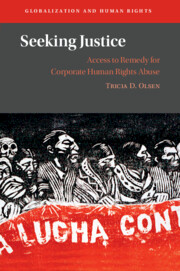
-
Select format
-
- Publisher:
- Cambridge University Press
- Publication date:
- 09 June 2023
- 15 June 2023
- ISBN:
- 9781009293280
- 9781009293242
- 9781009293259
- Dimensions:
- (229 x 152 mm)
- Weight & Pages:
- 0.56kg, 292 Pages
- Dimensions:
- (229 x 152 mm)
- Weight & Pages:
- 0.43kg, 291 Pages
- Subjects:
- Public International Law, Law, Human Rights, Business Ethics, Management
- Series:
- Globalization and Human Rights
You may already have access via personal or institutional login- Subjects:
- Public International Law, Law, Human Rights, Business Ethics, Management
- Series:
- Globalization and Human Rights
Book description
Seeking Justice: Access to Remedy for Corporate Human Rights Abuse explores victims' varying experiences in seeking remedy mechanisms for corporate human rights abuse. It puts forward a novel theory about the possibility of productive contestation and explores governance outcomes for victims of corporate human rights abuse across Latin America. This foundation informs three pathways that victims can use to press for their rights: working within the institutional environment, capitalizing on corporate characteristics, and elevating voices. Seeking Justice challenges the common assumptions in the governance gap literature and argues, instead, that greater democratic practices can emerge from productive contestation. This book brings to bear tough questions about the trade-offs associated with economic growth and conflicting values around human dignity-questions that are very salient today, as citizens around the globe contemplate the type of democratic and economic systems that might better prepare us for tomorrow.
Awards
Winner, 2024 Human Rights Best Book Award, American Political Science Association
Finalist, 2024 Grawemeyer Award for Ideas Improving World Order, University of Louisville
Reviews
‘… an outstanding contribution to the BHR field, both because of its substantive insights about access to remedy as well as the innovative methods it uses to reach them. It is also clearly written and filled with numerous relevant examples and testimonies.’
Jordi Vives-Gabriel Source: Business and Human Rights Journal
Contents
Metrics
Altmetric attention score
Full text views
Full text views help Loading metrics...
Loading metrics...
* Views captured on Cambridge Core between #date#. This data will be updated every 24 hours.
Usage data cannot currently be displayed.
Accessibility standard: Unknown
Why this information is here
This section outlines the accessibility features of this content - including support for screen readers, full keyboard navigation and high-contrast display options. This may not be relevant for you.
Accessibility Information
Accessibility compliance for the PDF of this book is currently unknown and may be updated in the future.


